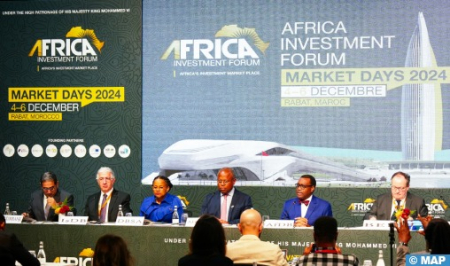
Africa needs more collective efforts to enhance sustainable development financing, unlock the continent’s growth potential, and reach development goals, Moroccan finance minister Nadia Fattah said.
“The long-awaited growth of our continent depends heavily on the ability of our countries to access the financing needed to achieve the goals of the 2030 Agenda for Sustainable Development and the African Union’s Agenda 2063,” Fattah said at the opening of the 5th edition of the Africa Investment Forum (AIF) held in Rabat dec.4-6.
She underscored the importance of international financial institutions strengthening their collaboration to mobilize more private capital, complementing public resources to provide significant funding for African economies.
“While commendable efforts have been made by Multilateral Development Banks (MDBs) to attract more private capital, we must acknowledge that there is still much to be done to enable the private sector to fully play its role in bridging the financing gap for the Sustainable Development Goals (SDGs),” the minister remarked.
She called on development partners to strengthen their support for structural reforms led by African governments, with a particular focus on improving project planning and fostering the creation of well-designed, financially sustainable initiatives.
“These reforms should be accompanied by measures to consolidate macroeconomic fundamentals and improve the business environment, which would ultimately change risk perceptions and challenge historical biases against Africa, allowing the full potential of private financing to be harnessed,” the minister advocated.
She further noted that global cooperation stakeholders should collectively explore the creation of a more effective global financial safety net, enabling rapid and automatic access to liquidity while reducing investment risk premiums.
This aligns with emerging global consensus on the anticipated benefits of reforming the global financial architecture, she said, stressing the importance of addressing the financing needs of middle-income African countries, given their critical role as sub-regional growth hubs.
“Now more than ever, development partners must enhance strategic collaboration and operate more cohesively to deliver greater impact in addressing the growing challenges facing African nations, such as rising debt risks, high youth unemployment, energy access, food insecurity, climate change, and the threat of future health crises,” she urged, emphasizing that partnership development must be central to MDBs’ long-term strategies to execute transformative projects.
Fettah underscored that the 2024 Africa Investment Forum offers a unique opportunity to “enrich our collective thinking, explore innovative solutions to persistent challenges, and strengthen the partnerships needed to achieve our aspirations,” reaffirming Morocco’s support for the AIF and all international efforts to advance Africa’s development and emergence, in line with the enlightened vision of His Majesty King Mohammed VI for a prosperous and self-reliant Africa.
Addressing the opening session, AfDB President Akinwumi Adesina underscored the investment opportunities offered in Africa, a continent with an increasing demand on infrastructure, housing, and consumer goods.
As Africa’s population is seen doubling to 2.4 billion by 2050, “Africa will brim with unparalleled demand for consumer goods and services, digital services, as well as housing, with the demand for housing expected to rise to an investment opportunity of $1.4 trillion,” he said.
The size of Africa’s food and agriculture market will rise to $1 trillion by 2030, he said, adding that demand for infrastructure presents an annual investment opportunity of at least $170 billion a year, from energy to transport, digital infrastructure, water and sanitation.
The AfDB Chief also highlighted Africa’s critical minerals potential, saying that the continent is poised to play a leading role in energy transition as it continues to attract prime investors thanks to its large deposits of critical minerals.
Africa holds 95% of chromium, 90% of Platinum Group Metals, 2/3 of global reserves of cobalt, 30% of lithium and manganese, and 20% of graphite—all of which are key for green transition, from electric vehicles to battery energy storage systems, he said.
“The size of the electric vehicle and battery energy storage systems will rise from $7 trillion in 2030 to $59 trillion by 2050,” he said, noting that Africa, which currently serves as a supplier of raw minerals, has a unique opportunity to move up the critical minerals value chain, with investments in critical minerals value adding industries.
The 2024 Africa Investment Forum (AIF), held under the theme ” Leveraging Innovative Partnerships for Scale,” positions itself as an essential platform, paving the way for strategic investments that support Africa’s economic transformation while providing direct access to transaction opportunities across the continent.
Since its inception in 2018, the AIF has generated nearly $180 billion in investment interest for major projects in energy, infrastructure, healthcare, and agriculture, cementing its status as Africa’s premier investment platform for global investors.
